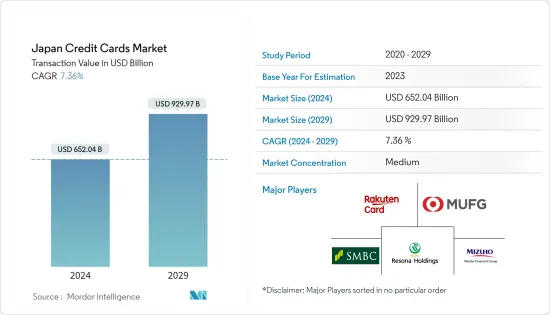|
|
市場調査レポート
商品コード
1431555
日本のクレジットカード市場:市場シェア分析、産業動向と統計、成長予測(2024年~2029年)Japan Credit Cards - Market Share Analysis, Industry Trends & Statistics, Growth Forecasts (2024 - 2029) |
||||||
カスタマイズ可能
適宜更新あり
|
|||||||
| 日本のクレジットカード市場:市場シェア分析、産業動向と統計、成長予測(2024年~2029年) |
|
出版日: 2024年02月15日
発行: Mordor Intelligence
ページ情報: 英文 145 Pages
納期: 2~3営業日
|
全表示
- 概要
- 目次
取引額ベースの日本クレジットカード市場規模は、2024年の6,520億4,000万米ドルから2029年には9,299億7,000万米ドルに成長し、予測期間(2024-2029年)のCAGRは7.36%となる見込みです。

日本はクレジットカードの普及率が高く、人口のかなりの部分が金融取引にクレジットカードを利用しています。日本のクレジットカード発行会社は、顧客を引き付け、維持するためにさまざまな特典を提供しています。キャッシュバック・プログラム、旅行特典、提携加盟店での割引、ロイヤリティ・ポイントなどは、クレジットカード・プロバイダーが提供する一般的な機能です。
日本の決済ネットワークであるJCBは、日本のクレジットカード市場で大きなシェアを占めています。全国の加盟店がJCBカードを広く受け入れています。しかし、VisaやMastercardのような国際的な決済ネットワークも強い存在感を示しており、広く受け入れられています。日本のクレジットカード市場は技術の進歩を受け入れてきました。非接触型決済、モバイル決済ソリューション、アップルペイやグーグルペイなどのデジタルウォレットは、日本で広く利用されています。また、日本のクレジットカード会社は、詐欺や不正取引から保護するためのセキュリティー対策の開発・導入に率先して取り組んできました。
日本政府は、クレジットカード市場における消費者保護のための規制を実施しています。これらの規制は、手数料の透明性を確保し、消費者のデータ・プライバシーを保護し、債権回収慣行に関する問題に対処することを目的としています。日本のクレジットカード市場は、特に中小企業や地方では現金取引を好むといった文化的要因の影響を受けています。しかし、政府の取り組みや消費者のデジタル決済手段の導入により、キャッシュレス決済への移行が徐々に進んでいます。
COVID-19の状況下で、社会的距離を縮める措置や対面取引の制限が行われる中、日本ではオンライン・ショッピングや非接触型決済へのシフトが加速しました。消費者は、eコマース取引や、デジタルウォレットやQRコード決済などのモバイル決済ソリューションで、物理的な接触を最小限に抑えるために、クレジットカードをますます利用するようになった。
日本のクレジットカード市場動向
クレジットカード発行枚数の増加
クレジットカードは、従来の現金決済から電子決済への移行を反映し、日本の消費者の間で人気を博しています。利便性の向上、加盟店での受け入れ拡大、さまざまな特典やベネフィットの利用可能性などが、クレジットカード需要の高まりに寄与しています。消費税率が8%から10%に引き上げられました。この増税に伴い、日本政府はキャッシュレス・キャンペーンを導入し、消費者のキャッシュレス決済利用を促進することを目的としたリベート・プログラムを実施しました。このキャンペーンは2020年6月末まで実施される予定であり、その1ヵ月後に予定されている2020年夏季東京オリンピックの前です。リベート・プログラムには、プリペイド・スマートカード、クレジットカード、デビットカード、QRコード決済サービスなどのキャッシュレス決済手段が含まれていました。クレジットカード発行会社は、小売業者やブランド、団体と提携して提携クレジットカードを発行することが多いです。このような提携は、カード会員にさらなるインセンティブや限定特典を提供し、顧客のロイヤリティを育み、より多くのクレジットカードの発行を促進します。日本政府は成長戦略としてキャッシュレス取引と電子決済を奨励しています。このため、クレジットカードやデジタル決済手段の利用を促進する取り組みが行われ、クレジットカード発行枚数の増加に寄与しています。
日本ではクレジットカードがデジタル・バイヤーの主要な支払い手段となっています。
クレジットカードは、確かに日本におけるデジタル購入者の主要な決済手段でした。しかし、デジタル決済の状況は急速に変化する可能性があり、その後変化があった可能性があることに注意する必要があります。クレジットカードは、日本でもオンラインショッピングを含む様々な取引に広く受け入れられ、利用されてきました。Visa、Mastercard、American Express、JCBといった大手クレジットカード会社は、日本国内で確固たる地位を築いており、大きな存在感を示しています。日本の消費者の多くは、その利便性、安全性、ポイント還元率の高さから、クレジットカードの利用を好んでいます。日本のクレジットカード会社は、カード利用を奨励するために、しばしば特別割引や加盟店との提携を提供しています。そのため、消費者はオンラインでの買い物にクレジットカードを使うようになります。また、一部のクレジットカード会社は分割払いのオプションを提供しており、顧客が多額の買い物を管理しやすくしています。
日本のクレジットカード業界の概要
日本のクレジットカード市場は競争が激しく、消費者が利用できるクレジットカードの選択肢は多岐にわたる。クレジットカードは広く受け入れられており、技術の進歩や消費者の嗜好の変化に伴い、市場は進化し続けています。日本のクレジットカード市場を独占しているのは、大手銀行とクレジットカード会社です。日本には、クレジットカード・サービスを提供する著名な銀行がいくつかあります。これらの銀行の中には、クレジットカード会社と提携したり、自社のブランド名でカードを発行している場合もあることは注目に値します。
さらに、日本のその他の地方銀行や専門銀行も、顧客にクレジットカードを提供しています。企業は、既存の顧客基盤や銀行との関係を活用して、顧客にクレジットカードのオプションを提供しています。技術の進歩は競合情勢に影響を与えます。日本では、モバイル決済サービス、デジタルウォレット、非接触型決済オプションが人気を集めています。クレジットカード会社や金融機関は、モバイル決済ソリューションを統合したり、デジタルウォレットサービスを提供したりして、こうした動向に対応しています。
その他の特典:
- エクセル形式の市場予測(ME)シート
- 3ヶ月間のアナリスト・サポート
目次
第1章 イントロダクション
- 調査の前提条件と市場定義
- 調査範囲
第2章 調査手法
第3章 エグゼクティブサマリー
第4章 市場力学と洞察
- 市場概要
- 市場促進要因
- クレジットカードの利用によるボーナスやポイント還元
- 市場抑制要因
- クレジットカードの金利
- 市場を形成する様々な規制動向に関する洞察
- 市場におけるテクノロジーの影響に関する洞察
- 業界の魅力- ポーターのファイブフォース分析
- 買い手の交渉力
- 供給企業の交渉力
- 新規参入業者の脅威
- 代替品の脅威
- 競争企業間の敵対関係
- 高インフレがクレジットカード市場に与える影響
- COVID-19の市場への影響
第5章 市場セグメンテーション
- カードタイプ別
- 汎用クレジットカード
- 特殊・その他クレジットカード
- 用途別
- 食品・食料品
- 健康・薬局
- レストラン&バー
- 家電
- メディア&エンターテイメント
- 旅行・観光
- その他のアプリケーション
- プロバイダー別
- Visa
- MasterCard
- その他のプロバイダー
第6章 競合情勢
- 市場集中の概要
- 企業プロファイル
- Rakuten Card
- Mitsubishi UFJ Financial Group
- Sumitomo Mitsui Financial Group
- Mizuho Financial Group
- Resona Holdings
- Japan Post Bank
- Aozora Bank
- Norinchukin Bank
- Shizuoka Bank
- JCB(Japan Credit Bureau)*
第7章 市場機会と今後の動向
第8章 免責事項と出版社について
The Japan Credit Cards Market size in terms of transaction value is expected to grow from USD 652.04 billion in 2024 to USD 929.97 billion by 2029, at a CAGR of 7.36% during the forecast period (2024-2029).

Japan has a high credit card penetration rate, with a significant portion of the population using credit cards for their financial transactions. Credit card issuers in Japan offer various rewards and benefits to attract and retain customers. Cashback programs, travel rewards, discounts at partner merchants, and loyalty points are common features credit card providers offer.
JCB, a Japanese payment network, holds a significant share of the credit card market in Japan. Merchants across the country widely accept JCB cards. However, international payment networks like Visa and Mastercard also have a strong presence and are widely accepted. The credit card market in Japan has embraced technological advancements. Contactless payments, mobile payment solutions, and digital wallets, such as Apple Pay and Google Pay, are widely used in the country. Japanese credit card companies have also been at the forefront of developing and implementing security measures to protect against fraud and unauthorized transactions.
The Japanese government has implemented regulations to protect consumers in the credit card market. These regulations aim to ensure fee transparency, safeguard consumer data privacy, and address issues related to debt collection practices. The Japanese credit card market is influenced by cultural factors such as a preference for cash transactions, especially in smaller businesses and rural areas. However, there has been a gradual shift towards cashless payments, driven by government initiatives and consumer adoption of digital payment methods.
During the COVID-19 situation with social distancing measures and restrictions on in-person transactions, there was an accelerated shift towards online shopping and contactless payments in Japan. Consumers increasingly relied on their credit cards for e-commerce transactions and mobile payment solutions, such as digital wallets and QR code payments, to minimize physical contact.
Japan Credit Cards Market Trends
Increasing in Number of Credit Card issued
Credit cards have gained popularity among Japanese consumers, reflecting a shift from traditional cash-based transactions to electronic payment methods. Increased convenience, wider acceptance at merchants, and the availability of various rewards and benefits have contributed to the rising demand for credit cards. The consumption tax rate was raised from eight to ten percent. With the tax increase, the government of Japan introduced the cashless campaign, a rebate program intended to boost the use of cashless payments among consumers. The campaign was planned to run until the end of June 2020 - before the Summer Olympics 2020 in Tokyo, scheduled to start a month later. The rebate program included cashless payment methods like prepaid smart cards, credit and debit cards, and QR code payment services. Credit card issuers often partner with retailers, brands, and organizations to issue co-branded credit cards. These partnerships provide additional incentives and exclusive benefits for cardholders, fostering customer loyalty and driving the issuance of more credit cards. The Japanese government has encouraged cashless transactions and electronic payments as a growth strategy. This has led to initiatives promoting the use of credit cards and digital payment methods, contributing to the increase in the number of credit cards issued.
Credit Cards are the Major Payment Option for Digital Buyers in Japan
Credit cards were indeed a major payment option for digital buyers in Japan. However, it's important to note that the digital payments landscape can evolve quickly, and there may have been changes since then. Credit cards have been widely accepted and used in Japan for various transactions, including online shopping. Major credit card companies such as Visa, Mastercard, American Express, and JCB (Japan Credit Bureau) are well-established in the country and have a significant presence. Many Japanese consumers prefer using credit cards for their convenience, security features, and ability to accumulate reward points. Credit card companies in Japan often provide special deals and partnerships with merchants to incentivize card usage. This further encourages consumers to use credit cards for online purchases. Some credit card companies also offer installment payment options, making it easier for customers to manage larger purchases.
Japan Credit Cards Industry Overview
The credit card market in Japan is highly competitive, with a wide range of credit card options available to consumers. Credit cards are widely accepted, and the market continues to evolve with technological advancements and changing consumer preferences. Major banks and credit card companies dominate the credit card market in Japan. There are some prominent banks in Japan that provide credit card services. It's worth noting that some of these banks may collaborate with credit card companies or issue cards under their brand names.
Additionally, other regional and specialized banks in Japan offer credit cards to their customers. Companies leverage their existing customer base and banking relationships to provide credit card options to their customers. Technological advancements influence the competitive landscape. Mobile payment services, digital wallets, and contactless payment options are gaining popularity in Japan. Credit card companies and financial institutions are adapting to these trends by integrating mobile payment solutions or offering their digital wallet services. Following is the list of credit card companies in Japan: Rakuten Card, Mitsubishi UFJ Financial Group, Sumitomo Mitsui Financial Group, Mizuho Financial Group, and Resona Holdings.
Additional Benefits:
- The market estimate (ME) sheet in Excel format
- 3 months of analyst support
TABLE OF CONTENTS
1 INTRODUCTION
- 1.1 Study Assumptions and Market Definition
- 1.2 Scope of the Study
2 RESEARCH METHODOLOGY
3 EXECUTIVE SUMMARY
4 MARKET DYNAMICS AND INSIGHTS
- 4.1 Market Overview
- 4.2 Market Drivers
- 4.2.1 Usage of Credit Card give the bonus and reward points
- 4.3 Market Restraints
- 4.3.1 Interest rates on Credit Card
- 4.4 Insights on Various Regulatory Trends Shaping the Market
- 4.5 Insights on impact of technology in the Market
- 4.6 Industry Attractiveness - Porter's Five Forces Analysis
- 4.6.1 Bargaining Power of Buyers
- 4.6.2 Bargaining Power of Suppliers
- 4.6.3 Threat of New Entrants
- 4.6.4 Threat of Substitutes
- 4.6.5 Intensity of Competitive Rivalry
- 4.7 Impact of High Inflation on Credit Card Market
- 4.8 Impact of COVID-19 on the Market
5 MARKET SEGMENTATION
- 5.1 By Card Type
- 5.1.1 General Purpose Credit Cards
- 5.1.2 Specialty & Other Credit Cards
- 5.2 By Application
- 5.2.1 Food & Groceries
- 5.2.2 Health & Pharmacy
- 5.2.3 Restaurants & Bars
- 5.2.4 Consumer Electronics
- 5.2.5 Media & Entertainment
- 5.2.6 Travel & Tourism
- 5.2.7 Other Applications
- 5.3 By Provider
- 5.3.1 Visa
- 5.3.2 MasterCard
- 5.3.3 Other Providers
6 COMPETITIVE LANDSCAPE
- 6.1 Market Concentration Overview
- 6.2 Company Profiles
- 6.2.1 Rakuten Card
- 6.2.2 Mitsubishi UFJ Financial Group
- 6.2.3 Sumitomo Mitsui Financial Group
- 6.2.4 Mizuho Financial Group
- 6.2.5 Resona Holdings
- 6.2.6 Japan Post Bank
- 6.2.7 Aozora Bank
- 6.2.8 Norinchukin Bank
- 6.2.9 Shizuoka Bank
- 6.2.10 JCB (Japan Credit Bureau)*






